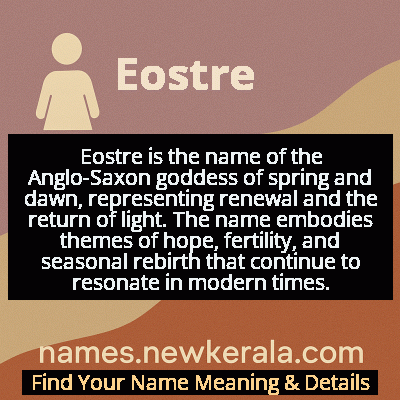Eostre Name Meaning & Details
Origin, Popularity, Numerology Analysis & Name Meaning of Eostre
Discover the origin, meaning, and cultural significance of the name EOSTRE. Delve into its historical roots and explore the lasting impact it has had on communities and traditions.
Name
Eostre
Gender
Female
Origin
Anglo
Lucky Number
1
Meaning of the Name - Eostre
Eostre is the name of the Anglo-Saxon goddess of spring and dawn, representing renewal and the return of light. The name embodies themes of hope, fertility, and seasonal rebirth that continue to resonate in modern times.
Eostre - Complete Numerology Analysis
Your Numerology Number
Based on Pythagorean Numerology System
Ruling Planet
Sun
Positive Nature
Leaders, ambitious, highly driven, self-reliant, innovative.
Negative Traits
Overly aggressive, domineering, impatient, selfish.
Lucky Colours
Red, orange, gold.
Lucky Days
Sunday.
Lucky Stones
Ruby, garnet.
Harmony Numbers
2, 3, 9.
Best Suited Professions
Entrepreneurs, managers, engineers.
What People Like About You
Courage, determination, leadership.
Famous People Named Eostre
Eostre (Mythological)
Anglo-Saxon Goddess
Divine figure influencing spring celebrations and Christian Easter traditions
Eostre Greenfield
Historical Fiction Author
Popularized Anglo-Saxon mythology through accessible modern literature
Eostre Morningstar
Neopagan Priestess
Revived ancient spring equinox traditions in contemporary spiritual practice
Name Variations & International Equivalents
Click on blue names to explore their detailed meanings. Gray names with will be available soon.
Cultural & Historical Significance
In contemporary times, Eostre has experienced a revival through neopagan movements and growing interest in pre-Christian European traditions. Modern practitioners of Wicca and other earth-based spiritual paths honor her during Ostara celebrations at the spring equinox, keeping alive the ancient connection between human ritual and natural cycles. Her legacy also persists in linguistic heritage, as her name directly influenced the English word for Easter and the German 'Ostern.' This cultural persistence demonstrates how ancient deities can maintain relevance by embodying universal human experiences—the joy of spring's return, the hope of new beginnings, and the celebration of life's resilience.
Extended Personality Analysis
Those named Eostre typically exhibit personality traits that reflect their namesake's association with spring and renewal. They are often characterized by an innate optimism and ability to inspire hope in others, much like the first warm days after winter. Eostres tend to be creative, nurturing individuals with a strong connection to nature and natural cycles. They possess a remarkable resilience, able to navigate life's challenges with grace and emerge stronger from difficult periods. Their presence often feels like a breath of fresh air—bringing light, warmth, and new perspectives to any situation.
In social settings, Eostres are typically compassionate and empathetic, with a natural talent for understanding emotional needs and supporting others through transitions. They often serve as catalysts for positive change in their communities, encouraging growth and development while maintaining a gentle, approachable demeanor. Their leadership style tends to be inclusive and visionary, focusing on collective well-being rather than personal ambition. Eostres usually have a strong aesthetic sense and appreciation for beauty, often expressing themselves through artistic pursuits or creating harmonious environments. Despite their gentle nature, they possess an inner strength that allows them to stand firm in their convictions and weather life's storms with remarkable poise.
Modern Usage & Popularity
Eostre remains an uncommon but meaningful choice in modern naming practices, primarily selected by parents with specific interests in mythology, paganism, or unique historical names. Its usage has seen a gradual increase in recent decades, particularly among families seeking names that connect children to nature, cycles, and ancient European heritage. The name is most popular in English-speaking countries with strong neopagan communities or among those interested in reviving pre-Christian traditions. While it doesn't rank on official baby name charts, Eostre has gained visibility through cultural references in literature, television, and seasonal celebrations. The name appeals to modern parents looking for a feminine name that is both distinctive and deeply symbolic, offering positive associations with spring, renewal, and hope without being overtly religious in a conventional sense. Its rarity ensures that children named Eostre will have a unique identity while carrying a name with rich historical and cultural resonance.
Symbolic & Spiritual Meanings
Eostre carries profound symbolic meanings centered on themes of transformation, balance, and cyclical renewal. As the goddess of dawn and spring, she represents the daily victory of light over darkness and the annual triumph of life over winter's death. Symbolically, the name embodies the concept of hope emerging from difficulty—the assurance that dark periods will inevitably give way to light and growth. Eostre symbolizes the perfect balance represented by the equinox, where day and night exist in harmony, suggesting the importance of equilibrium in all aspects of life. The name also carries connotations of fertility and creativity, representing the blossoming of ideas, relationships, and opportunities. In a psychological sense, Eostre symbolizes the human capacity for personal transformation and the ability to reinvent oneself after challenging experiences. The enduring symbols associated with her—eggs representing potential, hares symbolizing fertility, and flowers embodying beauty—create a rich tapestry of meaning that connects the name to universal human experiences of hope, renewal, and the eternal cycle of life.

